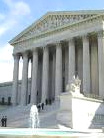|
|
|
U.S. Supreme Court to decide Alaska case
Court Watch |
2007/03/17 10:54
|
| The Supreme Court will hear arguments Monday in the case of Joseph Frederick, the Alaska high school student who was suspended for displaying a "Bong Hits 4 Jesus" banner. Other cases involving students' First Amendment rights are making their way through the courts: - In Vermont, middle school student Zachary Guiles wore a T-shirt that used images of cocaine use and a martini glass to criticize President Bush. The shirt also called Bush "chicken-hawk-in-chief" and said he was on a "world domination tour." School authorities said the shirt violated a dress code that bans clothing that promotes use of alcohol or drugs. Guiles taped over the images, sued and won rulings from lower federal courts. The Supreme Court has yet to act on the school district's appeal. - In suburban San Diego, Tyler Harper was pulled from his class for wearing a T-shirt bearing the words "homosexuality is shameful." Harper said he wore the shirt after his school backed an event meant to show support for homosexuals, bisexuals and trans-gender students. Harper sued the Poway Unified School District for violating his civil rights, contending he was suspended for expressing "sincerely held religious beliefs." The school said its dress code is designed to prevent disruption. A federal judge upheld the policy and the same federal appeals court that sided with Frederick now is considering the case. - A national Christian legal group sued a suburban Philadelphia school district on free-speech grounds, saying the district censors prayer club members and threatens discipline if students speak out against homosexuality. The lawsuit filed by the Alliance Defense Fund accuses the Downingtown Area School District of improperly forcing a student group to drop explicitly Christian or Scriptural references from its literature, and to meet as the "Prayer Club" instead of the preferred "Bible Club." |
|
|
|
|
|
|
Detroit Man Sentenced for Child Prostitution
Court Watch |
2007/03/16 08:15
|
| Robert Lewis Young of Detroit was sentenced today to 25 years in federal prison for running a criminal operation prostituting adults and children, Assistant Attorney General Alice S. Fisher of the Criminal Division and Stephen J. Murphy, U.S. Attorney for the Eastern District of Michigan announced. Following the 25-year sentence in federal prison, Young will face five years of supervised release for operating a prostitution ring spanning from Michigan to Hawaii. Young recruited and directed females – including minors – to engage in prostitution. Young transported women and children and facilitated their transportation across state lines by car and airplane. Young reaped substantial financial benefit and laundered the proceeds of his illegal prostitution activities with the help of co-conspirators. Young’s sentencing comes after his plea of guilt to 26 offenses including sex trafficking of children, sex trafficking by force, fraud or coercion, transportation of a minor for criminal sexual activity, transportation for prostitution, sexual exploitation of children, possession and interstate distribution of child pornography, threatening interstate communications, possession with the intent to distribute marijuana, felon in possession of a firearm, money laundering, and use of an interstate facility in aid of racketeering. In addition, Young was also convicted of producing and distributing child pornography for his use on a Web site to advertise the availability of his prostitutes including a 17-year-old-girl he exploited. As part of his sentence, Young was also ordered to forfeit property gained through and used in furtherance of his crimes including computer equipment, furs, clothing, jewelry, electronics and cash. Young’s co-conspirators have also been convicted of their role in the prostitution operation. Young’s Honolulu associates, Mark Luke White and Hae Sun Kim face sentencing later this year. Jeffrey McCoy, one of Young’s co-defendants pleaded guilty and was sentenced in Hawaii earlier this year. A second Detroit associate, George Abro, who laundered the proceeds and assisted in the prostitution ring, pleaded guilty to federal offenses in October 2006 and will be sentenced later this year as well. A Chicago dentist, Dr. Gary Kimmel, is under indictment and charged with financial offenses related to his support of Young's organization and is scheduled for trial in September 2007. The investigation is being conducted by the FBI, Michigan State Police, U.S. Postal Inspection Service, IRS, the Detroit Major Crimes Task Force, the Detroit Police Department, and the Macomb County Enforcement Team. In Hawaii, the investigation was led by the Internet Crimes Against Children Task Force comprised of members from the State Attorney General’s Office, the FBI, Immigration and Customs Enforcement (ICE), the U.S. Postal Inspection Service, and the Honolulu Police Department with substantial assistance from Assistant U.S. Attorney Wes Porter of the District of Hawaii. The case is being prosecuted by Trial Attorney Kayla Bakshi of the Child Exploitation and Obscenity Section (CEOS) of the Department of Justice’s Criminal Division and Assistant U.S. Attorney John O’Brien of the U.S. Attorney’s Office for the Eastern District of Michigan and Assistant U.S. Attorney Wes Porter for the District of Hawaii. In the spring of 2003, the Violent Crimes and Major Offenders Section of FBI headquarters, in partnership with CEOS and the National Center for Missing & Exploited Children, initiated the Innocence Lost Initiative, designed to address the growing problem of children forced into prostitution. To date, the Innocence Lost Initiative has resulted in 275 open investigations, 697 arrests, 160 informations or indictments, and 136 convictions in the federal and state systems. |
|
|
|
|
|
|
Conn. Woman Pleads Guilty for Human Trafficking
Court Watch |
2007/03/16 08:15
|
| Shanaya Hicks of Hartford, Conn., pleaded guilty today to five counts related to her role in a sex-trafficking ring that involved minors. Hicks is the eighth of ten defendants to plead guilty to federal charges in this case. On August 8, 2006, Hicks, along with nine other co-defendants, was charged in a 64-count superseding indictment. Hicks, and two additional co-defendants were also charged with the sex trafficking of minors and sex trafficking by force, fraud and coercion. Specifically, Hicks has pleaded guilty today to two counts of sex trafficking of minors; two counts of sex trafficking adult women through force, fraud or coercion; and conspiracy to use interstate facilities to promote prostitution. In her plea agreement, Hicks has admitted to causing two juveniles to engage in prostitution and causing two adults to be held in prostitution through fraud and coercion. Hicks waived her right to jury trial in open court before U.S. District Court Judge Christopher Droney. She faces a maximum penalty of up to life in prison and a fine of up to $1.25 million. “Sex trafficking is an abhorrent crime that too often occurs in our own backyards, and too often victimizes children,” said Wan J. Kim, Assistant Attorney General for the Civil Rights Division. “It is a top priority of the Justice Department to root out and prosecute those who so ruthlessly victimize others.” “The charges to which this defendant admitted her guilt clearly show that prostitution is not a victimless crime,” said, Kevin J. O’Connor, U.S. Attorney for the District of Connecticut. “The federal government is committed to prosecuting sex trafficking crimes, particularly when minors are abused and women are forced to commit sexual acts against their will and under the threat of violence.” Human trafficking prosecutions are a top priority of the Department. In the last six fiscal years, the Civil Rights Division, in conjunction with U.S. Attorneys’ Offices, has increased by six-fold the number of human trafficking cases filed in court. In 2006, the Department obtained a record number of convictions in human trafficking prosecutions. The case is being investigated by the Federal Bureau of Investigation, the Hartford and Windsor Police Departments, and the Internal Revenue Service. The case is being prosecuted by Assistant U.S. Attorney Jim Genco and Andrew J. Kline of the Department of Justice’s Civil Rights Division.
|
|
|
|
|
|
|
Court upholds ban on medical marijuana
Court Watch |
2007/03/15 09:04
|
| A California woman with an inoperable brain tumor may not smoke marijuana to ease her pain even though California voters have approved its medicinal use, a U.S. appeals court ruled on Wednesday. In a much-watched test case, the 9th U.S. Circuit Court of Appeals found there is no fundamental right to marijuana for medical purposes. The ruling agreed with a 2005 U.S. Supreme Court decision. The split three-judge opinion from Judge Harry Pregerson expressed sympathy for some arguments by plaintiff Angel Raich, 41, an Oakland resident whose doctor testified she could die if she stopped smoking pot. But the ruling backed the 1970 federal Controlled Substances Act barring marijuana. Raich, who suffers from many ailments, says marijuana keeps her alive by easing pain and bolstering appetite. "Today I found out I am basically a dead man walking," Raich, who once worked as an accountant and massage therapist, told Reuters. "Today the court said I don't have the constitutional right to basically stay alive." The mother of two said U.S. officials had never moved to arrest her or bar her from using marijuana and said she would continue to do so every two hours. "I'm damned if I do, damned if I don't," she said. Raich said she would lobby Congress in Washington to change U.S. law. The court said use of the drug for medical purposes was gaining support but federal law still banned it. "We agree with Raich that medical and conventional wisdom that recognizes the use of marijuana for medical purposes is gaining traction in the law as well," the judge wrote. The ruling acknowledged the law could change if legislators reconsider the issue. "Although that day has not yet dawned, considering that during the last 10 years 11 states have legalized the use of medical marijuana, that day may be upon on us sooner than expected," Pregerson said. Voters in California, the nation's most populous state, became the first to approve medical marijuana in 1996, putting it in direct conflict with federal law. Gov. Arnold Schwarzenegger has admitting using marijuana in the past.
|
|
|
|
|
|
|
Chiquita to pay $25M to settle terrorism claims
Court Watch |
2007/03/14 23:07
|
Chiquita Brands International, Inc. has reached a plea agreement with the US Justice Department to settle claims that Chiquita paid approximately $1.7 million to a Colombian terrorist group between 1997 and 2004 to protect banana harvesting operations in Colombia, according to a criminal information filed by the DOJ in federal court Wednesday. Chiquita itself released an SEC filing Wednesday, which states, in part: On March 14, 2007, Chiquita Brands International, Inc. ("the Company") entered into a plea agreement with the United States Attorney's Office for the District of Colombia and the National Security Division of the U.S. Department of Justice (together, the "government") relating to the previously disclosed investigation by the government into payments made by the Company's former banana-producing subsidiary in Colombia to certain groups designated under U.S. law as foreign terrorist organizations. Chiquita voluntarily disclosed the payments to the government in April 2003. Under the terms of the agreement, the Company will plead guilty to one count of Engaging in Transactions with a Specially-Designated Global Terrorist, and will pay a fine of $25 million, payable in five equal annual installments, with interest. The Company also will continue to cooperate with the government in any continuing investigation into the matter. As previously disclosed, the Company had recorded a reserve in 2006 of the full $25 million fine amount in anticipation of reaching a settlement with the government. The agreement is subject to approval and acceptance by the United States District Court for the District of Columbia.
The payments were made to the United Self-Defense Forces (AUC) of Colombia, which in September 2001 was designated as a terrorist organization by the US government. |
|
|
|
|
|
|
USS Cole families civil suit against Sudan begins
Court Watch |
2007/03/13 23:26
|
Testimony began Tuesday in the trial of a civil suit brought against Sudan by families of US military personnel killed in the 2000 bombing of the USS Cole. The families say Sudan has provided material support to al Qaeda since 1991, without which the attack that killed the US personnel would not have been possible. The 59 family members are seeking $105 million in damages. US District Judge Robert Doumar of the US District Court for the Eastern District of Virginia has nonetheless indicated that the federal Death on the High Seas Act will likely apply, limiting the maximum damages the families could receive to $35 million. Last month, Doumar denied a motion by Sudan to dismiss the suit based on the complaint's failure to connect Sudan with al Qaeda. An earlier motion to dismiss because the statutory limitations had passed was also dismissed. During the trial phase, the plaintiffs will try to prove that Sudan provided the terrorists with explosives, locations for training camps, and the cover of diplomatic pouches to transport materials. They will also allege that Sudan's New York consulate facilitated al Qaeda's 1993 bombing of the World Trade Center. Because the United States has listed Sudan as a sponsor of terrorism since 1993, Sudan cannot claim sovereign immunity. |
|
|
|
|
|
|
Wastewater for snow nixed by US appeals court
Court Watch |
2007/03/13 16:40
|
A plan for a local ski resort to use treated wastewater for snowmaking has been rejected by the 9th US Circuit Court of Appeals, which said the plan will pollute the sites and violate Native American rights under the Religious Restoration Act of 1993, a March 13 story in The Arizona Republic reported. The Arizona Snowbowl has been seeking approval to use recycled water for snow for over a year; last January a federal district court ruled against Indian tribes opposing the plan. The tribes appealed and presented their case to the Court of Appeals last September, the story said. The tribes believe the recycled water would be harmful to the mountain's deities and that the treated water could come from mortuaries, according to the story. Judge William A. Fletcher wrote in the court decision: "To get some sense of equivalence, it may be useful to imagine the effect on Christian beliefs and practices — and the imposition that Christians would experience — if the government were to require that baptisms be carried out with 'reclaimed water," the story reported. The ski mountain's owner, Eric Borowsky, said, "Snowbowl intends to vigorously pursue further judicial review." |
|
|
|
|
|
|
Class action or a representative action is a form of lawsuit in which a large group of people collectively bring a claim to court and/or in which a class of defendants is being sued. This form of collective lawsuit originated in the United States and is still predominantly a U.S. phenomenon, at least the U.S. variant of it. In the United States federal courts, class actions are governed by Federal Rules of Civil Procedure Rule. Since 1938, many states have adopted rules similar to the FRCP. However, some states like California have civil procedure systems which deviate significantly from the federal rules; the California Codes provide for four separate types of class actions. As a result, there are two separate treatises devoted solely to the complex topic of California class actions. Some states, such as Virginia, do not provide for any class actions, while others, such as New York, limit the types of claims that may be brought as class actions. They can construct your law firm a brand new website and help you redesign your existing law firm site to secure your place in the internet. |
Law Firm Directory
|
|








